Focused, Skillful, Challenging
The Essentials of Short Storytelling
The novel may be seen as the pinnacle of literary art, but the short story may be more true to the way we remember our lives—not in long, lumbering narratives, but in flashes, like summer lightning or a brief spring rain. Pointed, challenging, and demanding a high level of focus and skill, the short story has a long and noble history, with masters like Edgar Allen Poe, Ernest Hemingway, Flannery O’Connor, and Joyce Carol Oates included among its practitioners. The collections featured here are culturally diverse and run the gamut of human emotion; beautifully crafted, they are sure to entertain, provoke, and inspire.
Masks in the Tapestry

Jean Lorrain
Brian Stableford, translator
Snuggly Books
Softcover $9.99 (116pp)
978-1-943813-37-7
Buy: Local Bookstore (Bookshop)
Jean Lorrain is the pen name of Paul Alexandre Martin Duval (1855-1906), a French writer and journalist who, though he was one of the leading figures of the Decadent Movement, is remembered today mainly for his duel with Marcel Proust (both survived). His tales of queens, knights, princes, princesses, visions, and quests, ably translated by Brian Stableford, are almost trance-inducing in the beauty of their language, and their overall effect is that of gazing on stained-glass windows, each depicting a mythical adventure as they glow and dip into shadow with the changing light.
A young prince, the fruit of his mother’s adultery, was harshly raised in a cloister according to her orders. He has been taught to hate love, women, and “everything that flourishes under heaven.” Having vowed to kill the unfaithful knight who fathered him, he sets off on a quest seeking vengeance but finds something very different. Other tales include that of a young woman whom jealous fays have transformed into a hideous serpent awaiting only the kiss of her rescuer, of journeys to mysterious forests where luminous female forms appear in the treetops, and of the promise of a sleep that will “close the wounds of memory,” an offer that is tempting but is refused in favor of the rigors of life.
Such tales of enchantment and intoxicating beauty are typically thought to be for children, but it would be a precocious child indeed who would appreciate Lorrain’s masterful use of language or comprehend the situations that drive the protagonists’ quests.
Best enjoyed in a quiet place, these are fairy tales for adults to savor.
KRISTINE MORRIS (June 29, 2017)
Some Bore Gifts
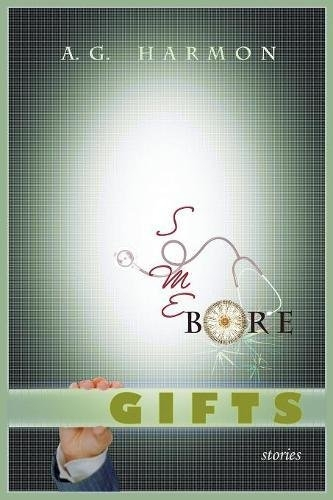
A. G. Harmon
World Galaxy Press
Softcover $12.95 (204pp)
978-1-927409-97-8
Buy: Local Bookstore (Bookshop)
Each of A. G. Harmon’s finely crafted stories is a portrait of a human soul—a Mexican tree cutter, burdened with a guilty heart, shares his need for atonement; a retired physician, who has been for his patients “the one to whom they held when they realized, at last, that love alone could not save them,” longs for the purpose and connection that his hobbies cannot provide; an English professor finds himself on the run, trying to escape the ecstasy his gift for teaching arouses in his students; an aging B-list actress longs for the day when she was seen and admired; an injured department store pianist comes to terms with the limits of his gifts and his life; an elderly florist rages against the changing times and attitudes that are driving her to bankruptcy; and more. All are flawed, needy human beings confronting endings of one sort or another—the loss of a dream, of a relationship or career, of an era, or of life itself—and meeting these endings with emotions that range from panic, to ecstasy, to blessed acceptance.
Harmon is a gifted, compelling storyteller, and his characters are beautifully and sensitively rendered. Whether they are funny and awkward, lost and stumbling, in a panic or serene, light shines through them, gently glimmering as it plays on the threads of memory, or flaring brightly as their souls open in moments of realization.
KRISTINE MORRIS (June 29, 2017)
Biketopia
Feminist Bicycle Science Fiction in Extreme Futures
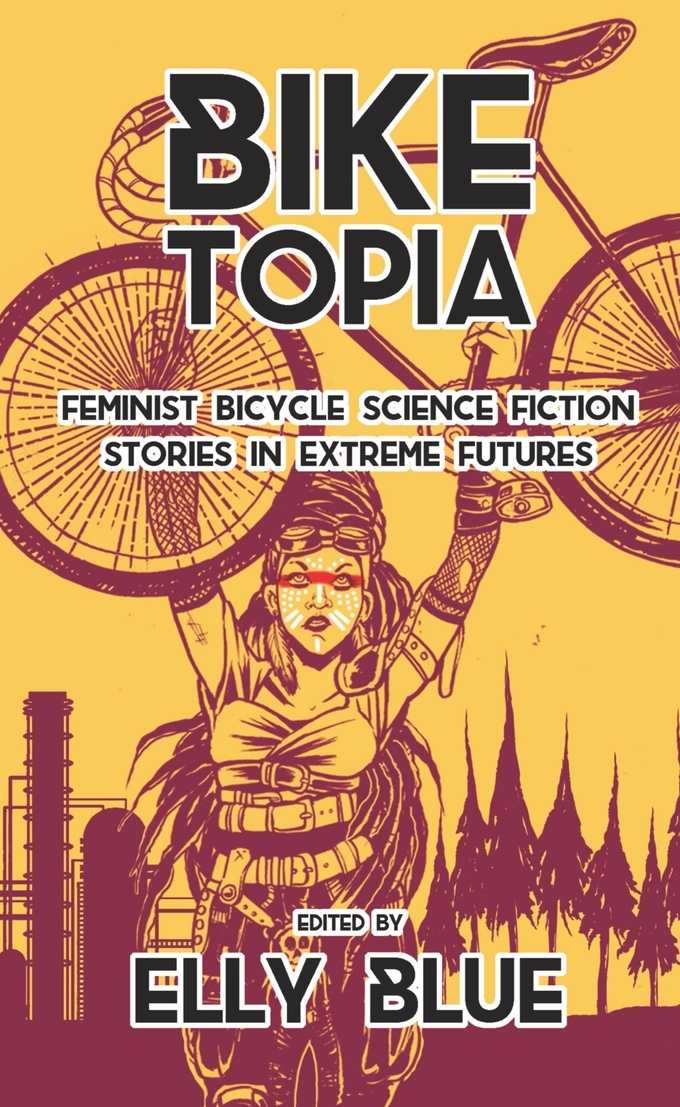
Elly Blue, editor
Microcosm Publishing
Softcover $9.95 (128pp)
978-1-62106-206-6
Buy: Local Bookstore (Bookshop)
Bicycles are big in the future utopian or dystopian worlds imagined by the contributors to Elly Blue’s collection. Whether working in an asteroid mine and having to make do with a stationary bike while pondering the nature of AI fellow workers; learning to communicate with a new, advanced bike that will respond to its rider only when its true name is discovered; musing over the possibility that your bike repair lady, who might be a robot, has just hit on you; being pregnant in a society in which all your vital functions are monitored and broadcast to the community at large (for your own good); or discovering that a gruesome means of feeding the remaining population has been developed in the aftermath of a zombie apocalypse, bicycles still offer what they’ve always offered here on Earth: freedom, contact with nature, and an inexpensive, nonpolluting form of transportation. For some of the collection’s strong heroines, they are also a means of escape.
Thought-provoking and disturbing, the stories demand that we face questions that, not too far down the pike, may require answers of us: whether or not robots have rights; how far a society can be allowed to go in monitoring its members; whether or not current sexual mores and gender roles are still relevant in a new world; how to relate to machines that are becoming more and more like humans; and how best to develop the skills needed to survive in an environment that appears hostile to human life.
KRISTINE MORRIS (June 29, 2017)
Bad Endings
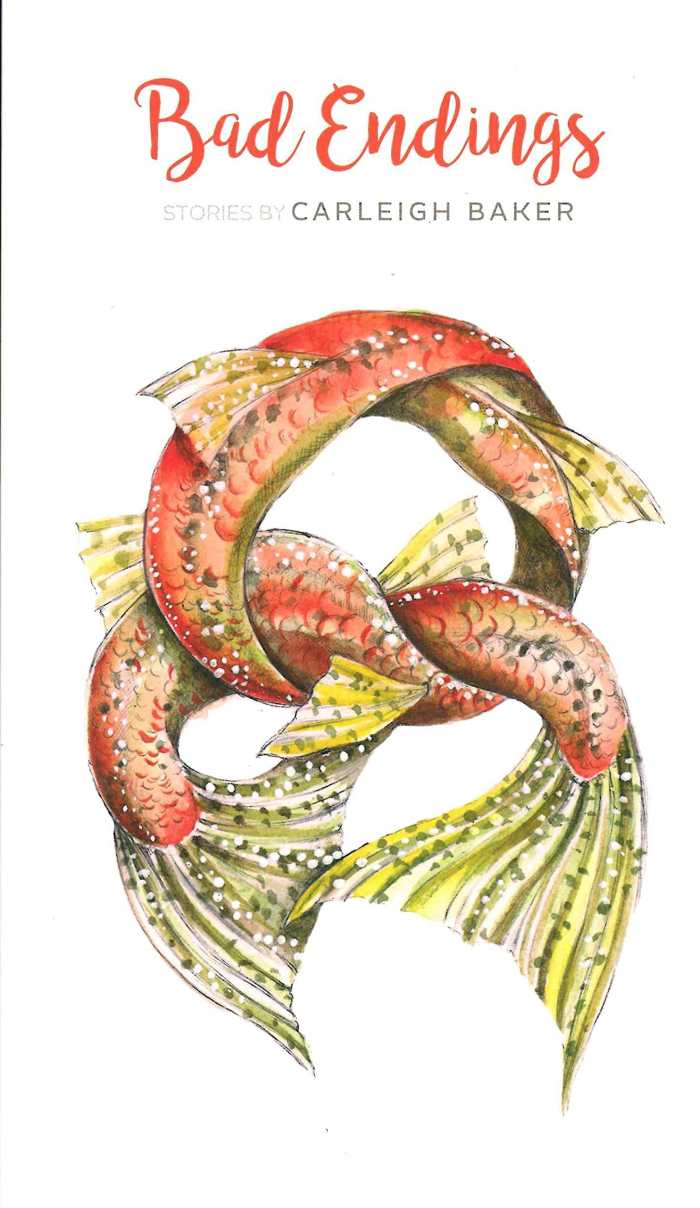
Carleigh Baker
Anvil Press
Softcover $18.00 (168pp)
978-1-77214-076-7
Carleigh Baker’s characters can’t seem to hide their quirkiness—their oddities stick out, obvious to everyone but them. They’re all uniquely inept and unqualified to deal with the situations they’re in, whether it’s marriage, a job, even just tying knots. The settings in which they find themselves are, if not always foreboding, at least drab enough to inspire a good case of depression; for an urban couple, both accountants bored with their marriage, even a canoeing trip near the Arctic Circle becomes stretches of mud, stunted trees and equally stunted, or absent, conversation until their desperation inspires an escape. Some make fragile connections. Some just keep running. “This is how life works,” one of Baker’s characters says, “Points for endurance.” Memories don’t bring much comfort either—another remarks, “Christmas was a lot creepier in the seventies.”
Baker is a skillful, sensitive writer with an uncanny gift for subtle, dark humor and the ability to assume the viewpoint of her characters, whether a small child contemplating death; a father watching as his pregnant daughter’s abusive marriage spirals out of control; a woman running from a “good” husband; a woman just released from the psych ward who takes a look at what’s out there and decides she may not be ready after all; or people in relationships as superficial and fragile as a skiff of ice at the edge of a lake that the pale sun cannot seem to warm. There is no judgment or condemnation in these stories, but a tender, deep savoring of the quirks that make us human.
KRISTINE MORRIS (June 29, 2017)
To Lay to Rest Our Ghosts
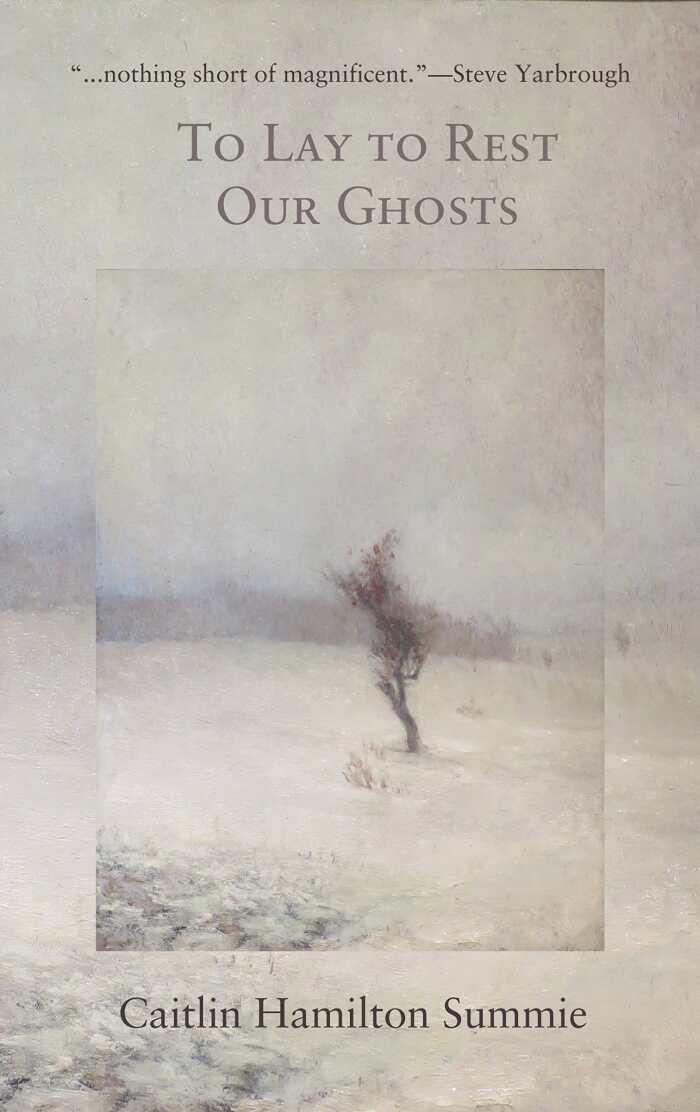
Caitlin Hamilton Summie
Fomite Press
Softcover $15.00 (216pp)
978-1-944388-06-5
Buy: Local Bookstore (Bookshop)
What is remembered; what is missed; what will never be again—these are the things Caitlin Hamilton Summie holds in her deft hands, opening them to us and calling us to look, to taste, to feel. The palpable void left in a small child’s life by a father’s death in war; the loss of a sister whose inner light and exuberance had been all that could hold a fragile family together; what happens in a mother’s heart the first time her child turns away from her; the struggle to find one’s place in a world in which sensitivity is a liability; even the need to fight out one’s grief—all these are addressed with the tenderness of a wise observer whose heart is large enough, kind enough, to embrace them all without judgment.
Summie’s intense and finely crafted stories are set in places as diverse as World War II Kansas; a poor, crime and drug-ridden New York City neighborhood; and the countryside and Twin Cities of Minnesota. Her characters are ordinary, flawed human beings struggling to find their place in the world and bumping up against others who are equally flawed. Attempts are made to dull the pain with busyness, drink, denial, or the passage of time, but Summie knows better than to offer these as answers. Instead, her stories reach into the hidden places of the heart and break them open to healing light, offering a touch of grace and hope of reconciliation.
KRISTINE MORRIS (June 29, 2017)
Annie Muktuk and Other Stories
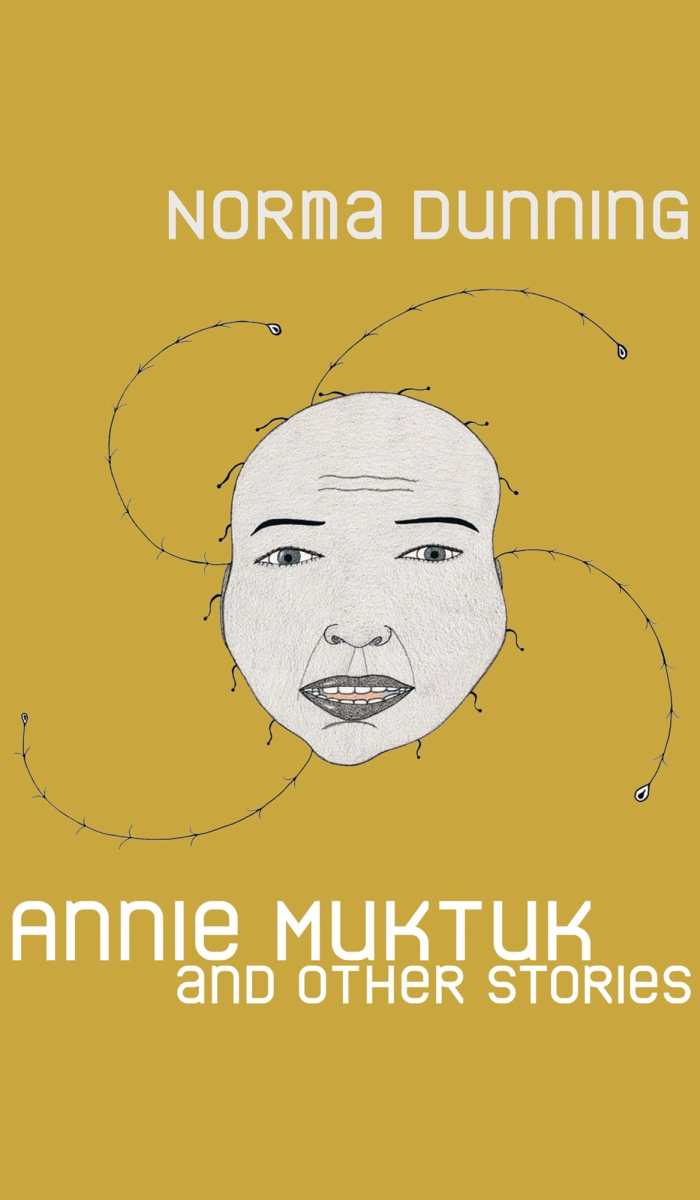
Norma Dunning
The University of Alberta Press
Softcover $19.95 (216pp)
978-1-77212-297-8
Inuit writer Norma Dunning brings a visceral understanding of traditional Inuit ways of knowing and being to her stories. Gritty, harsh, and compelling, they expose how racism, forced assimilation, and the holdovers of colonialism have played out in human lives and hearts caught in the clash between traditional and modern cultures. Through them, we learn of the brutal efforts that were made to destroy Inuit culture, values, communities, and traditional ways of life. She writes of children torn from their families and sent to boarding schools where they were taught to fear a god who would “cover them in fire” for disobedience, where rape and abuse were common, and where speaking their own language would result in torture. She tells of women who fall in love with white men only to be used and betrayed, and of the toll that drink and drugs have taken on lives and relationships.
Dunning’s stories, nuanced and deeply felt, reach deep into the heart of what it means to be Inuit, into the sacred place where the songs of the north are still sung, visions are still seen, and the spirits still speak. From this place, it is possible to laugh at those who come to destroy. From this place, dignity is maintained and the connection to the turning of the seasons is unbroken. Together with grief for what has been lost, there is power and light in these stories. Dunning, in her dedication to the book, affirms that the spirits of the Ancestors can still be heard: “These are your words written from my heart,” she writes.
KRISTINE MORRIS (June 29, 2017)
Turf
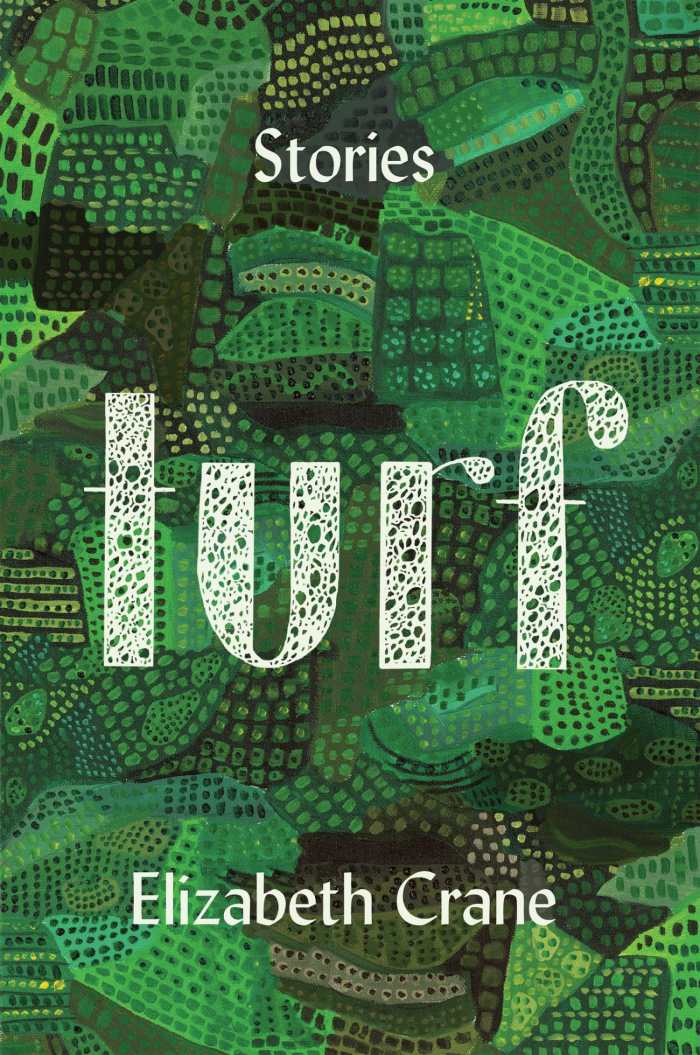
Elizabeth Crane
Soft Skull Press
Softcover $16.95 (208pp)
978-1-61902-934-7
Buy: Local Bookstore (Bookshop)
Strange things happen in the worlds created by Elizabeth Crane. An unusually tall woman is sleeping on the shelves in a grocery store; “star babies’ have taken over the whole United States, except for Puerto Rico; an exclusive group of male geniuses (they don’t know any female geniuses) meets to congratulate themselves on their lofty intellects, ruminate over the loneliness of being the smartest person in the room, and lament the difficulties of never being wrong. There is an unusual preoccupation with the “stuff” of life in these stories, and Crane shows just how much can be learned about people from the things they’ve allowed to accrue around them. Some of her tales are made up of lists, including a particularly poignant, and funny in a sad sort of way, list of all the things that she’s afraid of, including the fear that she’s unqualified to do anything she might get paid for; afraid that when she goes through menopause, she’ll grow a huge lumberjack beard; even afraid that her thoughts are not normal.
In Crane’s worlds, time can get lost in basements, up chimneys, in unused web addresses or lost socks. Even death won’t resolve this problem, because time is different over there. But who knows? Maybe ordering a cake the size of a living room would satisfy, or purchasing enough metal roosters to cover the whole front yard would finally be enough to make you feel safe.
Crane’s imagination is delightful, ebullient, even irritating at times, but in a good way. One thing for sure … it’s never boring.
KRISTINE MORRIS (August 15, 2017)
A River, One Woman Deep
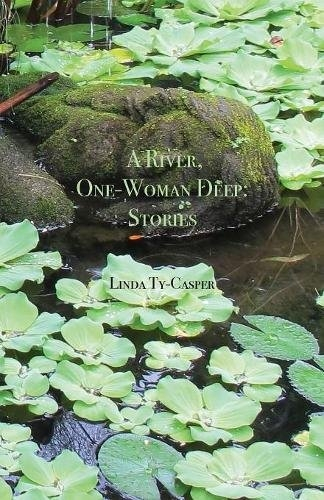
Linda Ty-Casper
Philippine American Literary House
Softcover $18.99 (228pp)
978-0-9719458-5-2
Buy: Local Bookstore (Bookshop)
Linda Ty- Casper’s Filipina and Filipina-American protagonists find that their struggle to discover their personal identity is complicated by events or memories of events that happened in their homeland.
Memory plays a vital role in Ty-Casper’s stories: a mother remembers her conflicted relationship with her daughter and wonders if she ever really loved her; a daughter, now middle-aged and still feeling unloved, discovers mementos of her childhood carefully preserved in a small room; another woman’s happy memories of being raised by loving aunts are disturbed by hints that she might have been an illegitimate child.
In “Happy,” a young Filipina woman whose parents have died in a car crash near Big Sur moves to Sausalito, where she thinks she is “safe from common memories.” Playing with her image as she tries to make sense of her life, she shields herself by declaring that she doesn’t remember whenever recall would be painful. In “Celery, Tulips, and Hummingbirds,” a young woman’s fragmented memories of her uncle’s visits to her childhood home and the time he spent alone with her mother leave her wondering at the fact that her name and his are disturbingly similar.
Shadowy figures, once-loved faces that cannot now be recalled, and recollections of whispered conversations haunt Ty-Casper’s characters; one of them asks, hopefully, if there is a book that explains memories. Ty-Casper does not answer that question, nor suggest that all memories are worth keeping; instead, she offers intriguing glimpses of what may happen when memories are suppressed or explored.
KRISTINE MORRIS (August 15, 2017)
Kristine Morris

